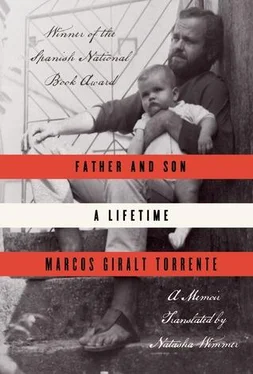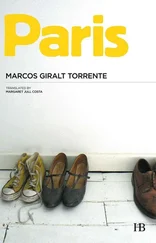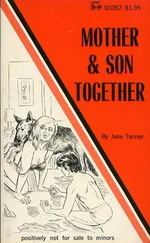* * *
He was competitive.
* * *
Not a day went by when he didn’t do the crossword puzzle in the paper, and if someone in his presence hadn’t completed a puzzle or was completing it too slowly, he would grab it and finish it himself.
* * *
He watched television, enjoyed it, and was irritated by the phoniness of other people’s public denial of the habit. He watched it after lunch as he dozed or did other things, and possibly at night.
* * *
At cheap restaurants he wiped his glass and silverware with a napkin. He was squeamish. If I touched my shoes or my feet, he scolded me; if I didn’t wash my hands before eating, he scolded me; if I touched a bar or strap unnecessarily on public transportation or touched anything on the street, he scolded me. He could be very scathing about it.
* * *
He was affectionate. Brusquely affectionate: his hasty pats on the back were intended to cancel out the ease with which he got choked up.
* * *
I have to pick up the chronological thread again because otherwise I’m afraid that the distance I feel from the person I used to be will paralyze me and all my efforts will be in vain.
From 1991 to 2002, it’s the same feelings all over again, and sometimes worse, the skein of mutual resentment growing tangled.
From 1991 to 2002, I make frequent attempts to absolve and forget, turn over a new leaf, but something always happens to stir everything up again.
From 1991 to 2002, there’s an extremely long period during which I’m in serious financial straits, during which I face responsibilities for which I’m not prepared, and the contrast with my father’s comfortable life wounds me. From 1990 to 2002, I often feel brushed aside by him, abandoned in my difficulties.
In 1991, after a nearly sold-out show, my father buys me a stereo and heads to Peru and New York for a few months with the friend he met in Brazil. In 1991, when he returns, I tell him over the phone that while he was away, her children moved back into their house, and when I visit later, the friend he met in Brazil lashes out at me. She screams that I have no say there. She screams that the woman is the mistress of the house and she gives the keys to anyone she likes. Her rage grows, the insults mount, and there’s a moment when I break down and cry. It bothers me that one of her children witnesses it all, and that after a few weak attempts, my father doesn’t stand up for me. For days I don’t pick up the phone when he calls, and when we see each other at last, he brings me a set of house keys on a ring to which he’s tied a beach stone. Some time later, however, I discover that the friend he met in Brazil has replaced the lock on the door that separates the entryway from the rest of the house. When I point this out to my father, he claims that the door in question is never locked and that he doesn’t have a key to it either. When I tell him how absurd that is, he says he doesn’t care, that if he ever finds it locked, he’ll break it down himself. Soon afterward, he actually does, but the door is repaired and the lock changed.
In 1991 there are a few months when I don’t see my father.
In 1991, one morning when I’m especially tired of myself, on my way out of class I notice a girl, in red lipstick and a beige coat, sitting on the stairs, and because of her I become a regular at the university library and cafeteria.
In 1992 I’m living at my mother’s with the girl in red lipstick. Tensions arise from our shared living situation; my father observes it all from such a distance that his interventions are worse than useless. He hints that he doesn’t like my girlfriend, but he seems to want to please my mother, to take her side this time.
In 1992, one night when I’m passing by my father’s house, partly to rattle my girlfriend, who’s with me, and partly out of the resentment I always feel, I ring the bell and we run away.
In 1992 my father has a show in New York, and he spends some time there with the friend he met in Brazil.
In 1992, in June, I graduate from college and my mother gives me a year to write.
In 1993 my father loans me the keys to his country house so I can go there with my girlfriend for the weekend. Days after we return, the friend he met in Brazil, from whom my father has vainly tried to hide this, calls to berate me for having been there. This time my father joins in on the other phone when he hears her yelling, argues with her, and threatens to move out if she doesn’t give up her obsession with me.
In 1993 I’ve begun my first book. I write it at night while my girlfriend sleeps in the same room. Each time I finish a story I send it to a writer friend of my mother’s for suggestions. In April I win an arts grant after submitting what I’ve written. It’s just one more occurrence, as fortuitous as most of the others that constitute this timeline. I might just as well not mention it or bring up other equally true-to-life events, and the substance of the story would be unchanged.
In 1993, one day at the end of the summer when I call my father at ten-thirty at night, the friend he met in Brazil gives me a nasty scolding for calling so late and hangs up after informing me that he’s in the country. I do reach him there, and since he’s alone, he invites me to come out for a few days. I arrive the next morning by train, but late that afternoon the friend he met in Brazil appears. She comes stealthily into the house, bursts into the living room where we’re watching a movie, and without greeting me or my father, she says to her daughter, who’s with her, “I told you he wouldn’t waste any time coming here.” My father, if he hears this, shows no sign of it. That night I sleep with the daughter in a room open to the living room, she in the bed and I on the floor on the sofa cushions. After the light is turned out, in the half darkness and perfectly conscious of what I’m doing, I get out of my makeshift bed, naked as I am, and go to the kitchen for a glass of water. When I come back, the daughter of the friend my father met in Brazil invites me to climb in next to her. After a second of hesitation, in which I’m tempted to consummate this petty triumph, she thinks better of it and I return to my bed, relieved.
In 1993, in the fall, my father has an opening in Cologne and then he travels around Germany with the friend he met in Brazil.
In 1994 they go to Austria, where he has shows at galleries in Innsbruck and Kufstein.
During one of these trips I risk letting myself into their house with the keys tied to a beach stone that my father gave me a few years before. As I expected, I find the second door locked, and I can get no farther than the entryway. Later, when they’re back in Madrid, I try my luck one day when I know they’re out to lunch. Since their absence will be brief, I suspect that the friend my father met in Brazil may not have taken precautions, and I’m right. I spend a frenetic half hour inside and emerge with two bottles of wine from the cellar. I do this again a few days later.
That same year, 1994, after finishing my story collection, I send it to an editor chosen because of her friendship with my mother, and the editor soon rejects it with a letter that ends like this: “The same manuscript, on the same subject, once the craft has been learned, might have the potential to become a book.” In 1994 my mother’s business is in trouble, and we spend months cutting corners to make ends meet, but that night my mother, my girlfriend, and I go out to a restaurant for a consolation dinner. Before we go, I talk to my father on the phone, and he hints that maybe the book is no good and asks whether someone trustworthy has read it. He’s at a loss, caught between his realist instincts and his desire to encourage me. For the same reasons he reacts cautiously when a few months later I tell him that another publisher will bring it out in the spring of 1995. He asks me for the manuscript, or I offer it to him; he leafs through it in front of the television and concludes that he’d rather read it after it’s published.
Читать дальше












